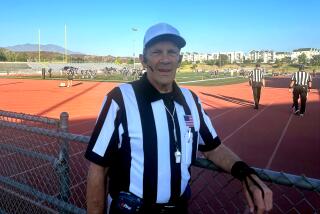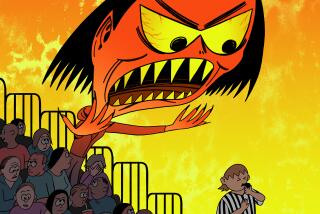WORLD CUP USA ’94 / QUARTERFINALS : What Did He Say? : They May Not Speak Same Language, but Referees Can Still Pick Up on Players’ Intent
- Share via
DALLAS — Sandor Puhl, who is Hungarian, has been assigned to referee Saturday’s World Cup quarterfinal game between Italy and Spain.
According to his official biography, he speaks Hungarian and German.
So if an Italian player calls him a goat or a Spanish player demeans his heritage, Puhl probably will not understand the exact terminology.
But he doesn’t have to be fluent in Italian or Spanish to get the gist of a player’s remarks, pull out his notebook and issue a yellow card for dissent or ungentlemanly conduct.
Jose Torres Cadena of Colombia speaks Spanish, English and Portuguese. It’s unlikely that he would know a Bulgarian vulgarity if he heard one, or that he would blush at a string of German curses if they were said with a smile.
He will referee Sunday’s quarterfinal game between Bulgaria and Germany, and, like Puhl, he need not be able to chat with players to decide that one has questioned his authority and deserves a caution.
But how do referees know players are cursing them if they don’t speak the languages of the teams whose games they are officiating?
“Good question,” said David Will, chairman of the FIFA referees’ committee.
And the answer is that they often don’t know. Not precisely, anyway.
“FIFA doesn’t give you a dictionary,” said Roy Gatewood, who has officiated at every level in the United States and was a FIFA referee liaison for World Cup games played in Orlando, Fla. “You don’t have time for one of those Sharp (pocket) translators.
“In a lot of instances, it’s as much connotation and circumstance as what’s actually said. It’s not so much cursing as the way a player is going at the ref or at another player.”
In the World Cup tournament, assignments are made based on the official’s performances, not on the languages he speaks. His compatibility with his linesmen might be considered, but his fluency in the languages spoken by the competitors is not a factor.
Even referees who speak an array of languages rarely are assigned to games in which they can use those skills.
Peter Mikkelsen of Denmark, who speaks Danish, English, German and French; Mario van der Ende of the Netherlands, fluent in Dutch, English, French and German, and Manuel Diaz Vega of Spain, who can converse in Spanish, Portuguese, Italian and English, are the most versatile linguists on FIFA’s tournament referee list. Yet even though they might be able to work as United Nations translators, they would need help to talk to players in most of the games they have officiated.
Mikkelsen worked a first-round game between Spain and South Korea. No Danish there. Van der Ende refereed Italy-Ireland--he might have understood the Irish players, but not the Italians. Diaz Vega was assigned the Netherlands’ opener against Saudi Arabia. If FIFA had wanted someone who could speak to the Saudis, it could have sent Jamal Al-Sharif of Syria, who speaks Arabic and English. But Al-Sharif was busy refereeing Colombia’s game against Romania. His second-round assignment was Mexico-Bulgaria.
Puhl’s other games included Brazil-Sweden and Norway-Mexico. No Hungarian spoken there.
FIFA won’t allow its referees and linesmen to talk with reporters during the tournament. However, Will, whose committee assigns the officials, and officials who have worked in top-level competition say a language barrier is not a problem. Boorish behavior and what Will called “visible protestation” are obvious no matter the language, and the rules that deal with those cases are equally clear.
Said Bob Heilmann of Tampa, Fla., a FIFA-certified linesman who worked qualifying games leading up to this World Cup, “We have a handbook to help us, but it’s not help in terms of learning what the F-word is in Spanish. It’s survival skills, medical tips, how to say, ‘Where is the bathroom?’ not how to say, ‘Go to hell!’
“I’m sure I’ve been cursed in other languages. Many times I’ve done games involving Greek teams, players with Greek backgrounds. They may be saying things about me I don’t understand. My attitude is, ‘Is he coming at me and is it dissentful and disrespectful?’ ”
Said Will: “The referee has to judge by the player’s action and tone. It really comes down to dissent of the decision, if a player visibly protests in dissent of a decision.”
Will, who never refereed but has spent 20 years on national and international referees’ committees, also believes referees can give players leeway when emotions are running high.
“The laws give the referee discretion,” Will said. “He can shake his finger and say, ‘That’s enough of that,’ or give a yellow card if he wants to make it formal. If (the dissent) continues, he has the right to order a player off, but only in an extreme case, such as if he pushes or jostles the referee.”
To Gatewood, the key word is discretion.
“In the high school and college ranks, if (a player’s dissent) is audible, it’s a yellow card,” he said. “In some of those games that are on TV, you can read the player’s lips. In a larger stadium, you might be more tolerant because you can’t hear what he’s saying.”
Sometimes, it’s not what a player says, but what he does.
Germany’s Stefan Effenberg displayed his middle finger to the crowd after he was taken out of a game against South Korea, but Coach Berti Vogts sent him home before FIFA could take action. Romania sent striker Ion Vladoiu home for committing a vicious foul against Switzerland’s Stephane Chapuisat and for arguing with an assistant coach.
Joseph (Sepp) Blatter, general secretary of FIFA, said the organization would have suspended Effenberg had the gesture been reported and praised the two countries’ actions as in keeping with the spirit of fair play.
Said FIFA press secretary Guido Tognoni: “We believe behavior on the field is improving. . . . If you look on the (field) you see many nice gestures between the players. This is what we like and not what we have seen too much of in the past.”
But he hasn’t seen every game and every gesture.
“I was a spectator at the Morocco-Netherlands game,” Heilmann said. “The referee was Peruvian (Alberto Tejada Noriega). Moroccans speak whatever they speak, the Dutch speak whatever they speak. So he probably didn’t understand what they might have said.
“I’m convinced some of (the seven cautions Noriega issued) were for hand gestures . . . a ‘give me a break’ kind of gesture, which is interpreted as ungentlemanly.”
Heilmann learned the hard way that it’s important to pay close attention to gestures.
“I had the good fortune of teaching a year in Boston and I was coaching hockey,” he said. “There were a lot of Italian kids on the team. I made a physical gesture that I thought nothing of, but the boys were aghast. I didn’t know it, but it meant something else entirely to them. . . .
“The middle finger is universal. An arm swing and slap across the biceps is too. Otherwise, we can pick it up and we deal with it accordingly.
“The great thing about soccer is it’s universal. You don’t need a common language.”
More to Read
Go beyond the scoreboard
Get the latest on L.A.'s teams in the daily Sports Report newsletter.
You may occasionally receive promotional content from the Los Angeles Times.








